Kwantlen University by the numbers: A calculated look at our school’s student demographics
January 14, 2010 by Mitch Thompson · Leave a Comment
By Jacob Zinn & Mitch Thompson
To better understand how the generational groups at Kwantlen work, the Chronicle polled a sample of students from three campuses: Surrey, Richmond and Langley.
The students were asked what year they were born, how many computers they own, if they have a Facebook page and whether or not they agreed with the generational values usually associated with people their age.
They were then given a five-point history quiz in which major events were named. Students had to give a basic description of 9/11, the Challenger shuttle disaster, JFK’s assassination, knowledge of the Berlin Wall and the bombing of Pearl Harbour.
The following graphs are the compiled results.
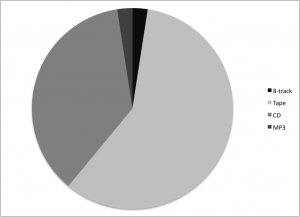
First music format purchase - Generation Y
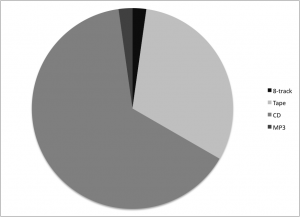
First music format purchase - Generation Z
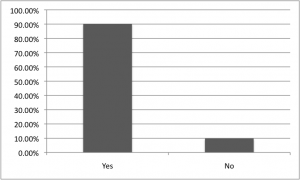
Facebook page - Generation Y
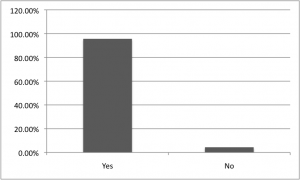
Facebook page - Generation Z
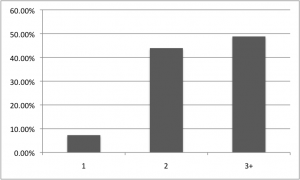
Number of computers owned - Generation Y
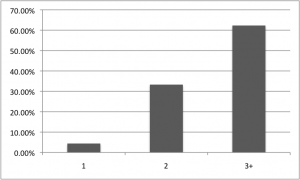
Number of computers owned - Generation Z
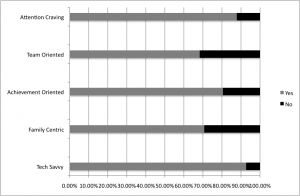
Agreement with generational characteristics - Generation Y
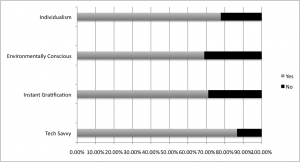
Agreement with generational characteristics - Generation Z
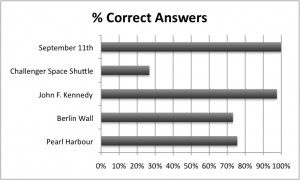
Percentage of correct answers to historical quiz - Generation Y
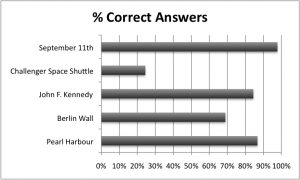
Percentage of correct answers to historical quiz - Generation Z
Students are learning more, but in danger of info overload
January 14, 2010 by Mitch Thompson · Leave a Comment

The overall population breakdown of Kwantlen Polytechnic University, based on age.
Almost half of Kwantlen students are members of Generations Y and Z, according to figures from the Institutional Analysis and Planning department, and were born into a world of personal computers and an explosion of information.
Generation Y includes people born between 1980 and 1989; Generation Z is those born in 1990 and subsequent years. Student records show that 48.8 per cent of Kwantlen students were born between 1988 and 1992.
The Y and Z designations came from a need for a distinction between the Baby Boomers, who were born after World War Two, and their children, who were born between 1965 and 1980. Those children have been called the “after-boomers.â€
Canadian author Douglas Coupland coined the phrase Generation X in his 1991 novel Generation X: Tales for an Accelerated Culture. He believed the title signified the seemingly contradictory ways of post baby-boom society.
The name caught on,and the Y and Z labels followed.
According to an article on About. com, a New York Times-run website, Gen-Yers value family time and teamwork. Generation Z, however, is more individualistic and puts less stock in family values, according to an article in Australia’s Herald Sun.
But there is one overarching value that the generations share.
“The main value, given their age, is probably a thirst for knowledge and looking for means of meaningful self-expression,†said Peter Clayton, a Kwantlen instructor whose courses focus on media and sociology.
This need to know manifests itself in the widespread use of the Internet to discover information and communicate ideas to others.
“The more serious-minded of them spend an enormous amount of time online in the quest for knowledge,†said Clayton.
The older ways of researching, using libraries and books, are slowly being phased out in favour of websites such as Wikipedia or Google.
It’s a change that allows them to learn while delivering the content in a way that is culturally relevant to them, explained Clayton.
However, this cultural inclination towards technology has created never-before-seen consequences for those of Generations Y and Z.
“The downside of all the information technology is that, as far as
leisure time is concerned, people spend more time on their own,†said Clayton.
Generations Y and Z are characterized by physical isolation.
Though they may be talking to friends online, they are still alone at a computer, which can have a negative effect on how they socialize in public.
“On one hand [their culture] encourages them to be more outward-looking,†said Clayton. “But on the other hand, it encourages them to be more isolated and inward-looking.â€
As well, constant access to the Internet has created two generations that suffer from information overload, Clayton said.
“They are probably a lot more stressed out than they realize,†he said. The two generations have become walking dichotomies, Clayton believes, as they want to learn as much as possible, but suffer from extreme information overload.


